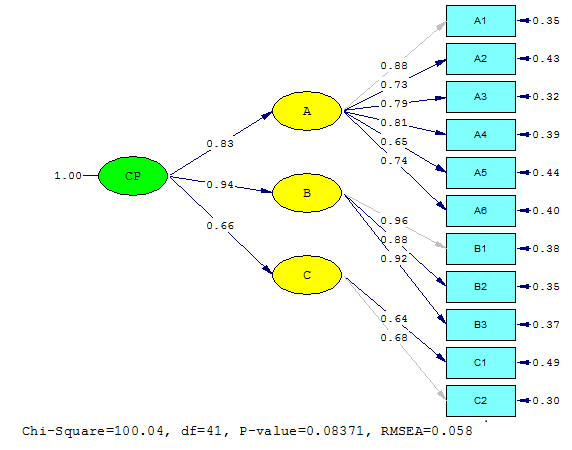Virtual Education in Islamic Azad Universities of Sistan and Baluchestan Province: Identifying Components and Outcomes
Keywords:
Education, Virtual Education, University, Islamic Azad University, Sistan and BaluchestanAbstract
The objective of this study is to identify the components and outcomes of virtual education in Islamic Azad Universities of Sistan and Baluchestan Province. This research employs a mixed-methods approach (qualitative-quantitative) with an exploratory sequential design. In the qualitative phase, the grounded theory method was applied, while the quantitative phase utilized a survey method. In the qualitative phase, the research sample consisted of 20 experts in the field of educational management, selected using criterion-based purposive and snowball sampling methods. Semi-structured interviews were conducted with these individuals. In the quantitative phase, the statistical population comprised students of Islamic Azad Universities in Sistan and Baluchestan Province (28,811 individuals), from which a sample of 379 students was selected using random sampling. The research instrument in the quantitative phase was a researcher-developed questionnaire, designed based on the theoretical model derived from expert opinions in the qualitative phase. For qualitative data analysis, MAXQDA software and Straussian grounded theory were employed, while quantitative data were analyzed using structural equation modeling. The components of virtual education included types of virtual education, characteristics of teaching methods, and assessment of education, with the characteristics of virtual teaching methods having the most significant impact. The outcomes of virtual education encompassed both positive and negative consequences, with positive outcomes carrying the highest factor loading. Overall, the findings of the quantitative phase confirmed the results of the qualitative phase. The results of this study emphasize the necessity of strengthening the characteristics of virtual teaching methods to enable individuals to use this space effectively and consciously. Moreover, positive outcomes play a more central role in the present analysis, which can be instrumental in designing policies and strategies to mitigate negative outcomes.
References
A. Bezi, H. Fakoori, A. A. Bayani, and H. Saemi, "Design and Validation of an Environmental Education Curriculum Model for Higher Education Based on the "Aker" Approach," (in eng), Iranian Journal of Educational Sociology, Research Article vol. 7, no. 1, pp. 79-90, 2024, doi: 10.61838/kman.ijes.7.1.8.
M. Delghandi, M. karimi, H. Nodehi, and M. Cherabin, "Designing an Efficient Virtual Education Pattern in Farhangian University," Sociology of Education, vol. 10, no. 1, pp. 280-294, 2024, doi: 10.22034/ijes.2024.2012176.1469.
F. Shariati, K. Niazazari, and N. Jabbary, "Presenting a Model for Virtual Education Considering Educational Equity with a Phenomenological Approach in Schools of Golestan Province," (in eng), Iranian Journal of Educational Sociology, Research Article vol. 7, no. 1, pp. 66-78, 2024, doi: 10.61838/kman.ijes.7.1.7.
A. Ali, "Virtual learning and technological advancements in higher education," Journal of Educational Technology, vol. 34, no. 2, pp. 102-115, 2021.
M. Ally, Foundations of educational theory for online learning (Athabasca University Press). 2021.
G. Moore and J. Dixon-Dynes, "Lifelong learning and virtual education," The Journal of Continuing Education, vol. 11, no. 2, pp. 200-213, 2023.
A. Villarreal, "Equity in education: How online learning bridges the gap," International Journal of Education and Development, vol. 42, no. 2, pp. 110-122, 2023.
I. E. Allen and J. Seaman, "Digital learning and the future of higher education," Online Learning Consortium, 2023.
P. Molina, "Crisis response in higher education: Adapting to global challenges," International Journal of Educational Development, vol. 48, no. 3, pp. 56-70, 2021.
A. P. Carnavale, "The global reach of online education: Opportunities and challenges," Educational Policy Review, vol. 50, no. 4, pp. 245-260, 2023.
M. Johnson and J. Wiltzius, "Developing digital skills for the workforce: The role of universities," Journal of Digital Education, vol. 29, no. 1, pp. 67-80, 2023.
T. Bates, Teaching in a digital age: Guidelines for designing and delivering online courses (Tony Bates Associates). 2022.
M. Al-Balas, H. I. Al-Balas, and H. M. Jaber, "Distance learning in clinical medical education amid COVID-19 pandemic in Jordan: Current situation, challenges, and perspectives," BMC Medical Education, vol. 20, p. 341, 2020, doi: 10.1186/s12909-020-02257-4.
D. Al-Fraihat, M. Joy, and J. Sinclair, "Identifying success factors for e-learning in higher education," in International Conference on e-learning, 2017, pp. 247-255.
Z. Azizi and H. Hosseini Nejad, "Opportunities and threats of virtual education during the COVID-19 pandemic: A phenomenological study," Journal of Information Technology and Communications in Educational Sciences, vol. 46, pp. 153-172, 2021.
A. Hajizadeh, G. Azizi, and J. Keyhan, "Analyzing the opportunities and challenges of virtual education during the COVID-19 era: An approach to developing virtual education in the post-COVID era," Scientific Journal of Teaching Research, vol. 9, no. 1, pp. 174-204, 2021.
A. Monavarian, A. A. Pivasteh, and S. H. Ehteshami Dizji, "Designing a model for delivering virtual education in the Social Security Organization of Iran based on grounded theory analysis," Public Management, vol. 13, no. 3, pp. 533-560, 2021.
M. Moseibi, S. Razapour, and F. Bahjati, "Problems and challenges of virtual education during the COVID-19 outbreak in elementary education," Journal of Educational Research, Teacher Training University, vol. 7, no. 27, pp. 25-35, 2021.
L. Sadati, "Explaining university professors' experiences of challenges and opportunities in virtual education during the COVID-19 crisis: A qualitative study," Journal of Development in Medical Sciences Education, vol. 14, no. 42, pp. 1-8, 2021, doi: 10.52547/edcj.14.42.1.
K. Savari and Y. Savari, "A qualitative study of lived experiences of virtual education from the perspective of students during the COVID-19 pandemic," Journal of Research in Curriculum Planning, vol. 73, pp. 49-63, 2022.
T. Sheikh, F. Koor, and A. Saghai Nia, "A model of virtual education with an emphasis on educational equity during the COVID-19 pandemic," Journal of Psychological Studies and Educational Sciences, vol. 8, no. 2, pp. 248-268, 2022.
R. Perkins, "Globalization and virtual learning: Expanding the boundaries of higher education," Global Education Review, vol. 18, no. 5, pp. 134-148, 2022.
M. Zarekhaili and F. Fariduni, "Pathology of virtual education from the perspective of elementary school teachers: A qualitative case study," Journal of New Advances in Educational Management, vol. 1, no. 2, pp. 12-32, 2020.












